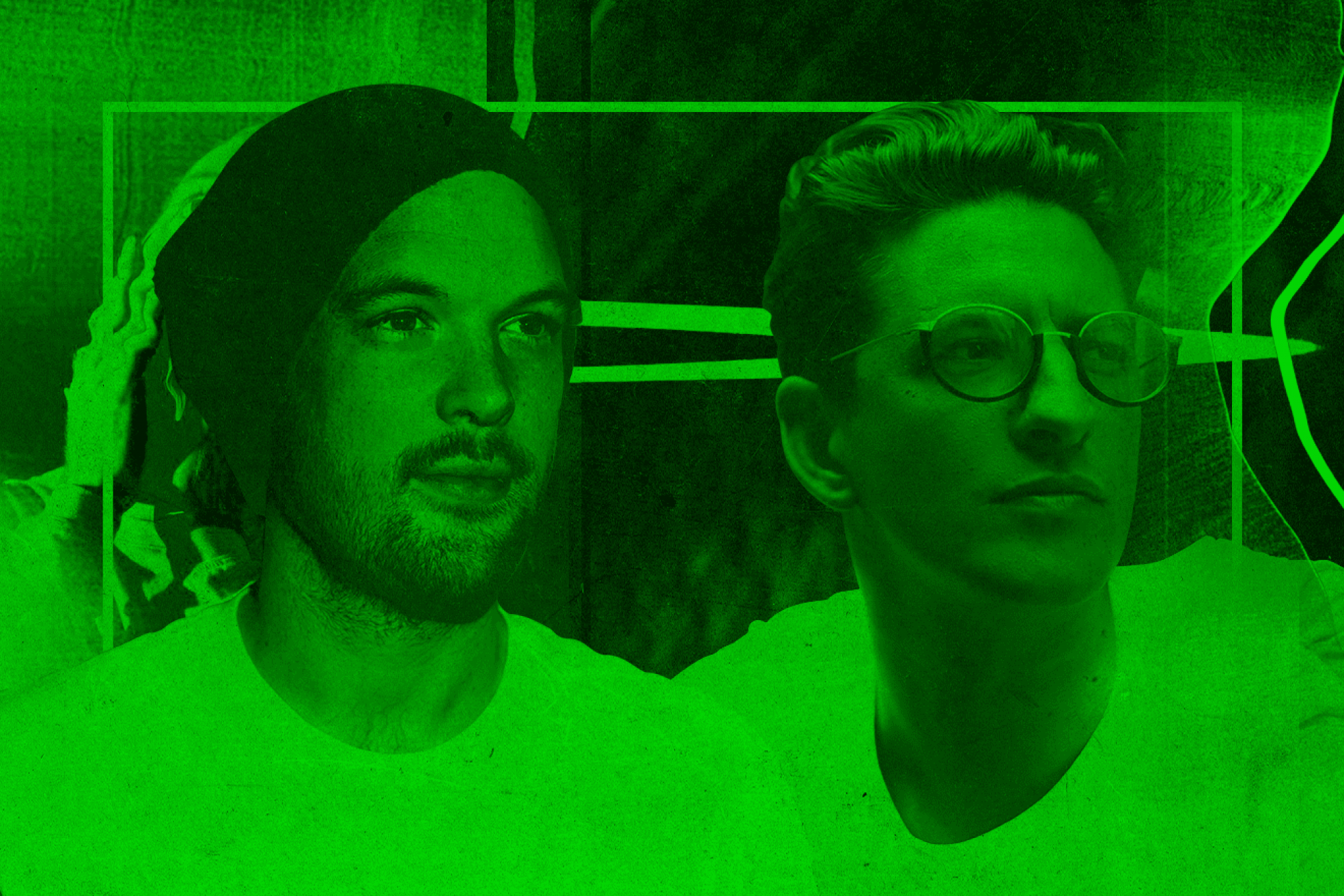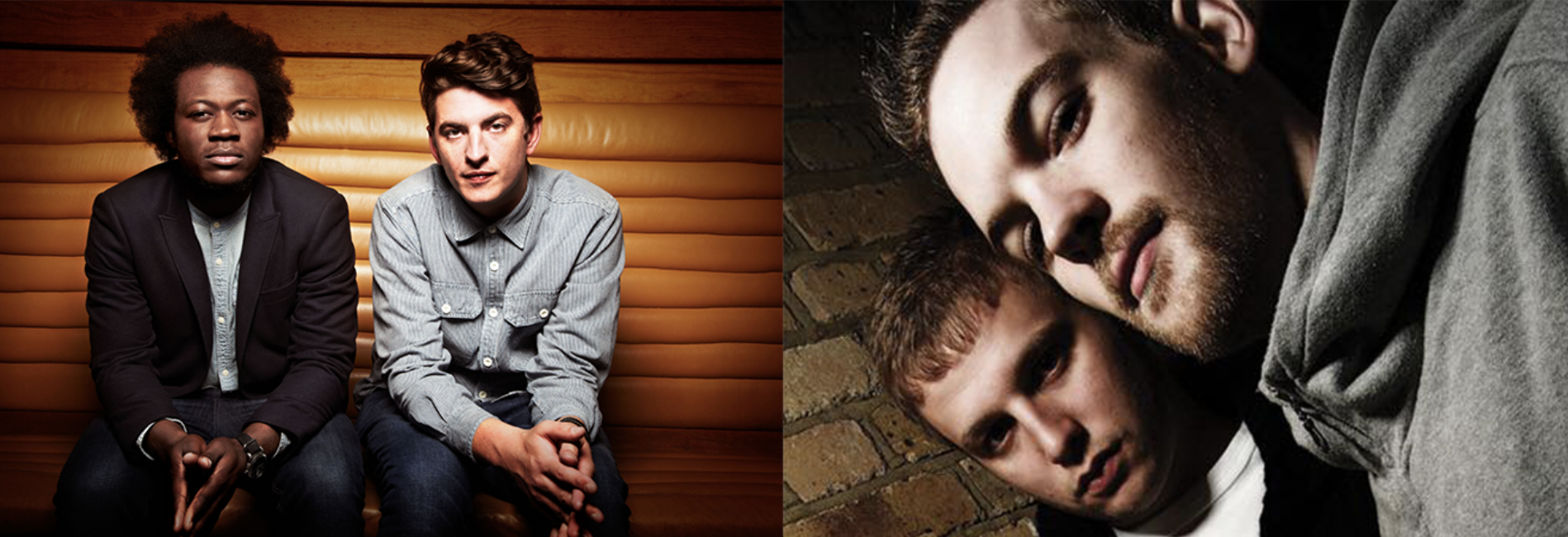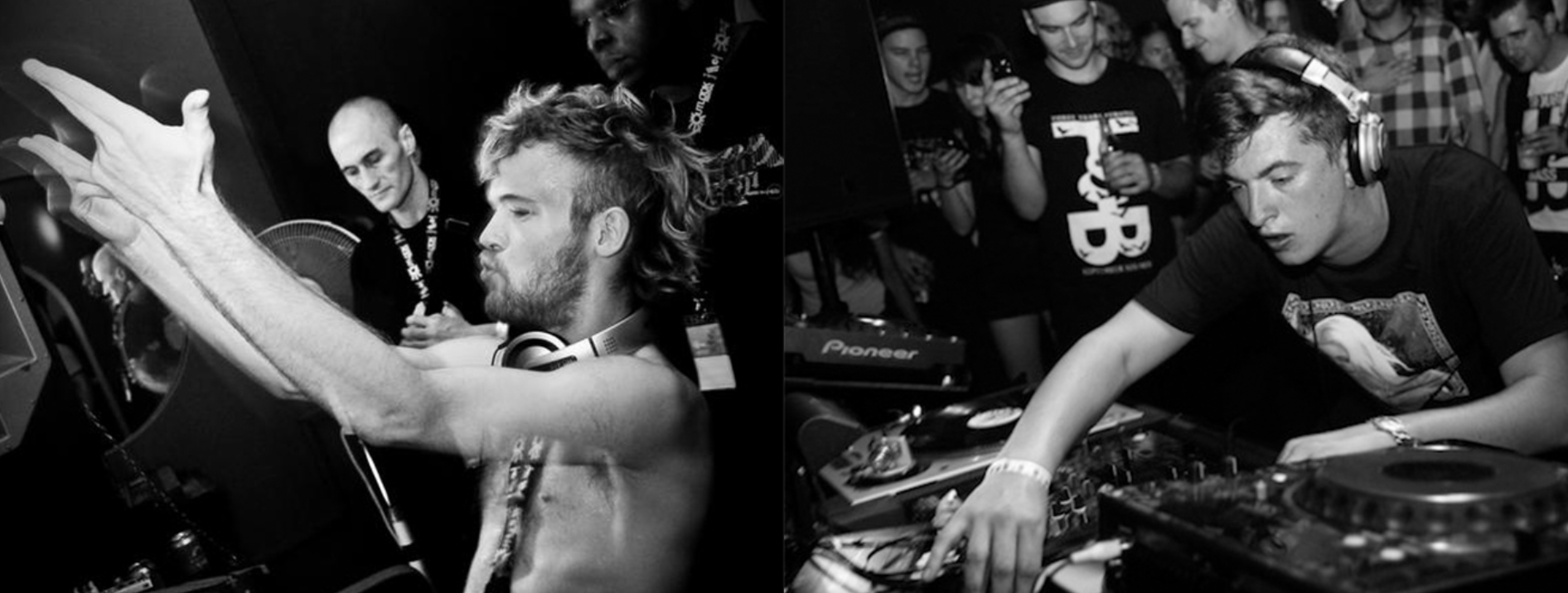 Artists
Artists
We spoke to Skream and Rusko before their b2b at this year's EDC
Skream teams up with Rusko for a one-off dubstep performance
From its meteoric rise to its subsequent and debatable "fall from grace" in the eyes of some of clubland's most loyal subjects, dubstep is often seen as a divisive genre. Despite the sound's schismatic tendencies today, the essence and importance of dubstep's initial introduction to the world of electronic music cannot be minimized.
Enter Oliver Jones (aka Skream) and Christopher Mercer (aka Rusko): two early leaders of the UK's thriving low-end culture who have both played a major role in taking dubstep to tremendous heights since the early 2000s. With their integral production and DJ partners by their sides - Benga in Skream's corner and Caspa in Rusko's - they cultivated a genre that started off as an alien sound living underground and grew into a sonic force hellbent on global dancefloor domination.
With their breakthrough collaborative track 'The Judgement' on Hatcha’s ‘Dubstep Allstars Vol.1’, Croydon's very own Benga and Skream embarked down a road towards dance music stardom at the tender age of 17. A duo that, according to Annie Mac, make Noel and Liam Gallagher “look like pussies”, Benga and Skream's rockstar enthusiasm and hyper-stylized sound ramped up the bass with balanced compositions and a taste for anticipation that was nothing short of enchanting.
In 2007, Caspa and Rusko's audacious take on the genre brought dubstep to new heights with the release of 'Fabriclive 37' - an era-defining mix CD that would accelerate the genre's momentum and ultimately launch it across the pond and into the US. Today, Rusko's big and raffish sound continues to shake and rumble the center of the dubstep scene.
It was around 2013 that Skream decided it was time for a change. He left the genre he helped invent behind in search for fresh and unexplored sonic pastures. Around the same time, he was famously misquoted by The Sun as saying "dubstep is dead" - a declaration that he called "pure tabloid press bullshit" during a chat with Mixmag.
Consistently hitting the studio and drawing massive crowds at gigs all over the globe, Skream's career is still in full swing, but he hasn't played a dubstep show since 2013. Now... that's about to change.
At this year's edition of EDC Las Vegas, Skream and Rusko will perform together for the second time in their careers for a rare "old school dubstep" b2b at the festival's bassPOD stage.
“The bassPOD stage at EDC Las Vegas is the biggest platform Bassrush has to showcase all spectrums of bass music," says Tony Merino, Head of Bassrush, on how this rare performance came to be. "Each year we strive to create special moments and push sounds that we love. This year we were brainstorming on who we would want to see play the stage. Around that time, Hatcha posted a video of him dropping a tune at Outlook that he claimed was a new unreleased Skream dubstep tune. We realized Skream playing a dubstep set at EDC would be a dream come true for us and bass music fans alike. We reached out to their team, had some extensive conversations, and it so happened to be it aligned with their plans.”
Ahead of this rare staging of dubstep's most exemplary creators, Mixmag caught up with Skream and Rusko to get their thoughts on the current state of the genre, how they plan to approach their set and why they've chosen EDC as the location for this noteworthy dubstep revival.
Check out interview the interview below.

Take us back to when the dubstep sound first started to form. Can you tell us about what was inspiring this innovative evolution of the music?
Rusko: The main base material that was molded into early dubstep was garage. The more minimal and harder "dark garage" sound was popularized by early tracks created by people like Skream. He can take it from here.
Skream: The genre’s origin has been pretty well documented. It was the end of UK garage as everybody knew it. Things were changing and to be honest, the change came about because a few kids were trying to make music on software that people were making in multi-thousand-pound studios. At first, we thought it was impossible. But through not having the equipment our idols were making music with, we ended up creating a mutation of UK garage that eventually transformed into dubstep.
You two are heralded as pioneers of dubstep. Who were some of YOUR musical pioneers? What else were you listening to at the time and what was it about dubstep that really captured your imagination?
Rusko: For me, it was a mixture of a couple of things. Iration Steppas’ Subdub sound system clash was a big influence with its heavy, electronically produced instrumental reggae. The other component, for Caspa and I certainly, was jump-up drum ‘n’ bass. The early 2000s saw a strain of heavy d ‘n’ b with wobbly bass and screechy noises blowing up alongside artists like GDub, Clipz, TC and Hazard who were pushing the jump-up style. Incorporating these sounds into the existing dubstep palate was the basic idea behind all those classic Rusko tracks.
Skream: My influences were mostly those producers making instrumental UK garage. That was the music I grew up on. Stuff by the likes of Horsepower Productions, Artwork, Menta and Oris Jay to name a few.
How and when did you two first come into contact with each other and how has your relationship evolved over the years?
Rusko: I first met Ollie at the afore-mentioned rave, Subdub. Previous to that, we had been chatting online for some time. In those very early days, the scene was so small and hardly any music was getting released, so AIM messenger became a sort of testing ground and trading place as we all helped each other out. The vibes were always nice.
Skream: I remember Rusko came to my studio back in the day to make a record that never got finished. I think it's called ‘Dungeons and Dragons’? I can't remember, honestly. Then we got booked to play a show together in Newcastle, England. I got a little loose and while we were playing b2b, I disappeared about 10 minutes into the show.
That’s a true story. I only thought about it the other day when I was speaking to Rusko about it. We weren’t from the same crew or the same area but we always had a solid rapport with one another. I think when it comes to what Benga and I were making around that period, we took it to one place and eventually, Caspa and Rusko took it to a different level entirely.
With any sound of any style of music, it needs to get taken by someone else and manipulated. That's what Caspa and Rusko did with their ‘Fabriclive 37’ mix in 2007. That release extends on a whole new generation of kids who got into dubstep.
How did the idea of doing an old school dubstep DJ set at EDC come to fruition? Why now?
Skream: The idea of me playing a set like this again is definitely not a new one. I've been getting asked to play sets of what I would consider my “older stuff” for fucking ages. I think a lot of the promoters and the areas that have asked me to do this are catering to crowds that have already heard what I have to offer a hundred times every weekend at dubstep night. I’m taking this as an opportunity to play to a crowd who, without many of them even knowing it, will be hearing the music that I made years ago which ended up influencing the sounds being played out at that stage during EDC.
12th Planet said to me about a year ago, “a lot of these new riddim sounds in the genre sound just like your old shit.” I'm not trapped in a time warp where I don't want to play my old music for the rest of my life, but I think playing my old shit at EDC will actually be like playing for fresh ears. I don't really want to go and play in cities for people who have heard these songs so many times already, because well... what’s the point? I want to play at a place where the crowd is hearing my stuff for the very first time.
I’ll be playing Skream records from 2004, 2005, 2006 and 2007. When I say it out loud, it doesn't make any sense to me, but what I'm forgetting is the kids who are 18, 19, 20 and 21... they were in fucking kindergarten in 2005! I declared I was never going to do it again because I'm only about moving forward, but I love the music I've made years ago. And I still do. So it's like, fuck it, whatever. Let's have a huge party.
Rusko: In a world of ‘riddim’, even my current tracks are classed as old school dubstep, in aesthetic at least anyway! And I am known for representing that sound everywhere I go, but especially at the larger US EDM festivals. I literally did NOT think Skream was gonna be up for this. It was the longest shot of longest shots as it’s well known he hadn’t played a dubstep set for years. Stylistically though, his classic output and mine - like a glove mate. It’s gonna be seamless.

How will your "old school dubstep" set differ from a typical dubstep set you might hear/see today?
Rusko: 10 bpm slower for starters! As well as a lot more melody and variation in sounds. One slice of bitter lemon for old man Rusko Barkeep, please.
Many of your listeners often claim that "dubstep lost its soul" during the genre's later evolution - when the sonic textures drifted away from the deeper essence of the early years. What are your opinions on this and how do you perceive the genre today?
Skream: I still consider myself very up to date with everything that is happening dubstep-wise these days. I feel like the individuals who say it “lost its soul” are people who are trying to rebel against what happened when it progressed with Americanization of dubstep. With the progression, dubstep actually ended up with a bigger soul than we could have ever imagined. The music we were making before Skrillex and the various US sounds came around... those artists are still doing what they're doing. I don't think it’s lost its soul at all, it's reverted back to the underground.
From what I can gather, all the boys I grew up with - Hatcha, Mala, Coki, Loafah - are still doing well. Because dubstep was the music of former generations, I think comments like that are blind and misdirected. It didn't lose an element like a lot of people asking me about things that I said in the past in regards to making dubstep. That was purely a personal thing.
Statements like that take away a lot from people who are working their asses off keeping the sound alive. I think it's still very much going and what’s changed is the mainstream attention has left. Regardless of that, there are still some fucking good tunes being made.
Rusko: I think it’s a bit like how a fish grows to fit the size of its tank. Deeper early dubstep is perfectly suited to sweaty dark clubs and later, full-on dubstep is perfectly suited to a festival like EDC for example. For me, it grew to fit the crowd and the venue. I love a chest rattler as much as a festival anthem.
How does approaching a dubstep b2b differ from your typical house or techno b2b? Is there a different approach?
Skream: I play house and techno records for 7-8 hours a night. So I'm playing records for 7-8 minutes. 9 minutes, 10 minutes, 15 minutes, etc. What I need to do now is reprogram into my fucking early 20s. I need to get wild. Playing dubstep, we’re fucking dipping into that record after 30 seconds. I've been getting back in the zone and getting my old records out. It's a completely different vibe from what I’ve been doing over the past few years. A typical dubstep set is 60 minutes and it's about playing as many records as you can. I need to get back into that mindset. I need to get fucking rowdy.
What can your fans expect to see and hear at this rare Skream and Rusko performances?
Skream: This will be the second time Rusko and I have ever played together in history, but I think we will have a fair balance of classic UK and US dubstep selections.
Rusko: We actually have a couple of days set aside purely to create a game plan and rehearse as we are both known for err... sometimes focusing on parting rather than mixing. It’s, of course, going to be everything you expect - a comprehensive history lesson of classic dubstep delivered pretty sloppily with much excitement and movement. Party time!
Oliver, do you think you might continue to explore some of your dubstep roots in a live setting following your EDC showcase?
Skream: I don't know if there's going to be another show, but I am open to the idea. At the moment I've got so much going on. Again, I'm all about moving forward and very happy where I'm at at the moment. Just staying focused on what I'm doing. It is fine to dip into it one night or a few special nights, but then I need to go back what I am doing currently. My career is far from over, so I don't want to rest on the laurel of having to resort back to stuff from my musical past. I'm very proud of it and I'll stand by it forever because it's what made me, but I need to stay active. I'm writing tons of records and concentrating on the here and now.
Some people get it a little bit twisted sometimes that I've shunned my past, but its not like that. If you look back to my career in 2004 and 2005, I was still trying to do different and new stuff then. I get bored pretty easily so I need to move around. Regardless of this fact, I’ll never stop celebrating the music that made me.
Cameron is Mixmag's Jr. Editor. Follow him on Twitter
Read this next!
The wisdom of Skream
The 13 best mid-2000s dubstep tracks
Denver's bass music community is the site of dubstep's resurrection



